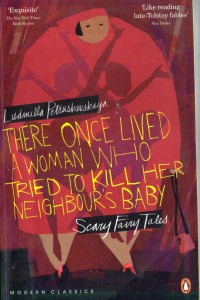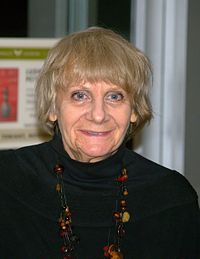 Watch the Interview with L. Petrushevskaya by V. Molchanov: “Game in Absurd”
Watch the Interview with L. Petrushevskaya by V. Molchanov: “Game in Absurd”
Her stories are not scary at all. Why they are represented like this, I do not have a clue. The cover of her book is shown here.
Lyudmila Stefanovna Petrushevskaya was born on May 26, 1938 in Moscow. Upon having graduated from the University, she worked at the magazine “Okoyom’, on television. In 1972 she worked at the theater, composed the plays, participated at the shows as an actress.
In 1976 the artist began to write the scenario for the film “Tale of Tales” of the most famous cartoon of Yury Norshteyn.
Watch: “Tale of Tales”
“This was the combination of incompatible. One character went through the whole film: a little Gray Wolf, a little creature, a child of war. Eternal soul that visits freely the golden age, the quiet harbor on the shore where a happy fisherman lives with his family, where a baby lies in the crib and his little sister clad in the ballroom dress jumps over the rope in the company of Picasso’s bull. The little Gray Wolf lives also in that place where a modern night city glimpses together with the roaring machines on the highway. Always where the people are departing for war. Where return from the war but not many. Where the wet lilac bushes around the table laid for funeral last meat are dropping their tears over a glass of vodka which to be left specially for the killed and covered by a piece of bread, bu the old Russian tradition. Good heavens! How I wept when I watched that movie!” (Petrushevskaya, 2002: 230).
company of Picasso’s bull. The little Gray Wolf lives also in that place where a modern night city glimpses together with the roaring machines on the highway. Always where the people are departing for war. Where return from the war but not many. Where the wet lilac bushes around the table laid for funeral last meat are dropping their tears over a glass of vodka which to be left specially for the killed and covered by a piece of bread, bu the old Russian tradition. Good heavens! How I wept when I watched that movie!” (Petrushevskaya, 2002: 230).
Look at the portrait of L. Petrushevskaya now.
Her first published book was “The Songs of the 20th Century. Plays”, 1988, “Immortal love: Stories” (1988), “Three Girls in Blue. Plays.” (1989), “On the Road of Eros God” (1992), “The Secrets of the House”. Now the piopularity came: many books are published, the prestigious prizes are delivered.
“The Ninth Volume” is a collection of the articles dedicated to the creativity of the writer, her social life, going through the pages which tell about her personal life. In front of us appears the woman having raised up the three children at hard times, having lost her husband and trying to build up a new life.
the pages which tell about her personal life. In front of us appears the woman having raised up the three children at hard times, having lost her husband and trying to build up a new life.
Her level of the truth is so unusual that the works of Lyudmila Stefanovna started to be called as “the other prose”, “the other”, “cruel”, “black”.
Lyudmila Stefanovna objects to the statement that her prose is “black’. She says that a person in the book as in the mirror, sees himself. One sees the good and weeps, the other person sees the evil on the basis of the same words.
The artist once said about the purpose of the literature: “Messiaen is not necessary, enough, that’ll do. But as a ground for the instant meditation about life, maybe?” (Petrushevskaya, 2002: 306).
Watch video:“Russian Rock in Personalities: Lyudmila Petrushevskaya”